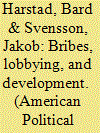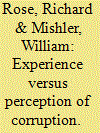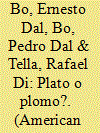|
|
|
Sort Order |
|
|
|
Items / Page
|
|
|
|
|
|
|
| Srl | Item |
| 1 |
ID:
105169


|
|
|
|
|
| Publication |
2011.
|
| Summary/Abstract |
When faced with a regulatory constraint, firms can either comply, bribe the regulator to get around the rule, or lobby the government to relax it. We analyze this choice, and its consequences, in a simple dynamic model. In equilibrium, when the level of development is low, firms are more inclined to bend the rule through bribery but they tend to switch to lobbying when the level of development is sufficiently high. Bribery, however, is associated with holdup problems, which discourage firms from investing. If the holdup problems are severe, firms will never invest enough to make lobbying worthwhile. The country may then be stuck in a poverty trap with bribery forever. The model can account for the common perception that bribery is relatively more common in poor countries, whereas lobbying is relatively more common in rich ones.
|
|
|
|
|
|
|
|
|
|
|
|
|
|
|
|
| 2 |
ID:
095015


|
|
|
|
|
| Publication |
2010.
|
| Summary/Abstract |
Corruption is important because it undermines bureaucratic predictability and is a potential threat to support for a political regime. The perception of corruption is the most commonly used measure of the actual incidence of corruption. This article marshals the New Russia Barometer survey data to challenge this assumption. Even though most Russians perceive a variety of everyday public services as corrupt, this assessment is not based on first-hand experience. Only a minority pays bribes. We test four hypotheses about differences in individual perception and experience of paying bribes: the ability to pay, contact with public services, normative acceptability and political awareness. Contact is most important for paying bribes whereas political awareness is most important for the perception of corruption. We also test how much the perception and experience of corruption, as against other forms of political and economic performance, affect support for the regime. Support is driven by the substantive performance of government, especially its management of the economy, rather than by the perception or experience of corruption.
|
|
|
|
|
|
|
|
|
|
|
|
|
|
|
|
| 3 |
ID:
173636


|
|
|
|
|
| Summary/Abstract |
Day-to-day policing represents a fundamental interface between citizens and states. Yet even in the most capable states, local policing varies enormously from one community to the next. The authors seek to understand this variation and in doing so make three contributions: First, they conceptualize communities and individuals as networks more or less capable of demanding high-quality policing. Second, they present original survey data and semistructured interviews on local policing from over one hundred sixty slums, eight thousand households, and one hundred seventy informal neighborhood leaders in India that contribute to the nascent empirical work on comparative policing and order. Third, they find evidence that well-connected individuals and densely connected neighborhoods express greater confidence in and satisfaction with local policing. Critically, these differences do not appear to be a function of a lower propensity for local conflict but rather of an increased capacity to leverage neighborhood leaders to mediate relations with the police. The combination of analytics and empirics in this article provides insight into the conditions under which individuals and communities experience the police as expropriators of rents or neutral providers of order.
|
|
|
|
|
|
|
|
|
|
|
|
|
|
|
|
| 4 |
ID:
069791


|
|
|
| 5 |
ID:
131765


|
|
|
|
|
| Publication |
2014.
|
| Summary/Abstract |
In a rapidly modernising Cambodia, dance parties that accompany large temple celebrations and weddings have become violent arenas where young men fight with fists and knives beyond police control. In 2010, this led to a ban on dance parties during the Pchu? Bi?? celebration. This paper concerns an ad hoc bribe to lift the ban that was collected in the manner of a meritorious temple offering. I suggest that the flexible parameters of Buddhist merit-making in this ritualised context both reconfigured the bribe and palpably brought expectations of moral conduct into the energetically charged dancing arena - but only momentarily.
|
|
|
|
|
|
|
|
|
|
|
|
|
|
|
|
|
|
|
|
|